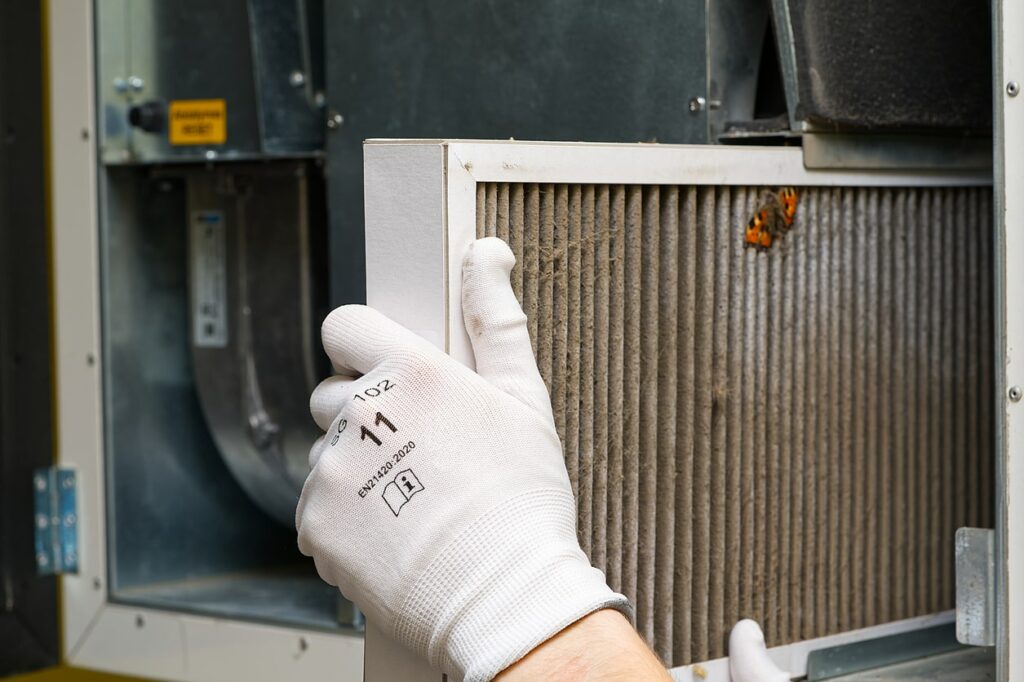When it comes to maintaining a healthy and efficient heating, ventilation, and air conditioning (HVAC) system, one of the most crucial components to consider is the air filter. HVAC filters play a vital role in improving indoor air quality by trapping dust, allergens, and other pollutants. They also protect the sensitive components of the HVAC system from damage. However, with various filter types and replacement schedules, making the right choice can be daunting. This blog dives into HVAC filter options and replacement recommendations.
Types of HVAC Filters
1. Fiberglass Air Filters
Fiberglass air filters are the most common and least expensive type of filter available. They are made of spun fiberglass and typically have a minimum efficiency reporting value (MERV) rating of 4. These filters are effective at capturing larger particles, such as dust and lint, but they may not be as efficient at filtering smaller contaminants like pollen or pet dander. While they provide basic filtration, they may not be suitable for those with allergies or respiratory conditions.
2. Pleated Air Filters
Compared to fiberglass filters, pleated air filters offer enhanced efficiency. They are constructed from cotton or polyester folds, providing a greater surface area to capture contaminants. Effective at filtering particles like pollen, mold spores, and pet dander, they have MERV ratings typically between 5 to 8. These filters are a favored option for homeowners seeking better indoor air quality at an affordable price.
3. High-Efficiency Particulate Air (HEPA) Filters
HEPA filters are the gold standard when it comes to air filtration. They are highly efficient at capturing even the smallest particles, including dust mites, bacteria, mold spores, and viruses. HEPA filters have a MERV rating of 11 or higher and are recommended for individuals with allergies or respiratory conditions. However, it’s important to note that HEPA filters can restrict airflow, so they may not be suitable for all HVAC systems. It’s best to consult with a professional to determine if your system can accommodate a HEPA filter.
4. UV Filters
UV filters are a specialized type of air filter that utilizes ultraviolet light to kill bacteria, viruses, and other microorganisms in the air. While they may not be as effective at filtering out dust or other contaminants, they can significantly improve indoor air quality by eliminating harmful pathogens. UV filters are often used in conjunction with other types of filters to provide comprehensive air purification.

When to Change Your HVAC Filter
General Guidelines
The frequency at which you should change your HVAC filter depends on several factors, including the type of filter, the level of indoor air pollution, and the specific needs of your household. As a general rule of thumb, it is recommended to replace your air filter every 90 days or three months. However, there are certain situations where more frequent filter changes may be necessary.
Pet Owners
If you have pets in your home, it’s essential to consider the impact of pet hair and dander on your HVAC system and indoor air quality. Pet hair can quickly accumulate in the filter, reducing its effectiveness and restricting airflow. For homes with pets, it is recommended to change the air filter every 60 days or two months.
Individuals with Allergies
Those with allergies or respiratory issues might find more frequent filter changes beneficial. A clean air filter can diminish the presence of allergens in the environment. For homes with multiple pets or individuals with allergies or respiratory conditions, it is advisable to change the filter every 20 to 45 days.
Dusty Environments
If you live in an area with high levels of dust or if your home is prone to dust accumulation, more frequent filter changes may be necessary. Dust can quickly clog up a filter, hindering its ability to trap contaminants effectively. In dusty environments, it is recommended to change the filter every 20 to 45 days.
Vacation Homes or Infrequently Used Homes
For vacation homes or homes that are not frequently occupied, the air filter may not need to be changed as frequently. In such cases, it is generally safe to wait nine to twelve months before replacing the filter. However, it is still important to inspect the filter periodically to ensure it is not excessively dirty or clogged.
Signs Your Filter Needs Changing
- Visible dirt or debris on the filter: If you notice a significant buildup of dirt or debris on the surface of the filter, it’s a clear indication that it needs to be replaced.
- Reduced airflow: If you notice a decrease in airflow from your vents, it could be a sign that the filter is clogged and restricting the passage of air.
- Increased energy consumption: A dirty or clogged filter can cause your HVAC system to work harder to maintain the desired temperature, resulting in higher energy bills.
- Allergy symptoms or respiratory issues: If you or your family members experience an increase in allergy symptoms or respiratory issues, it may be due to a dirty or inadequate air filter.
HVAC filters are essential for preserving indoor air quality and safeguarding your HVAC system. Selecting the appropriate filter and routinely replacing it guarantees peak performance and a better air environment in your residence. Account for elements like filter type, change frequency, and your household’s unique requirements.
Contact Us
For trusted advice and top-notch services, reach out to Progressive Air. With the right filter and proper maintenance, you can enjoy clean and healthy air in your home for years to come!

